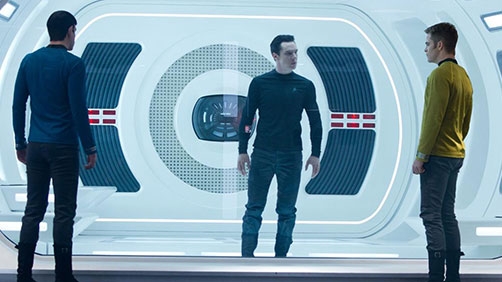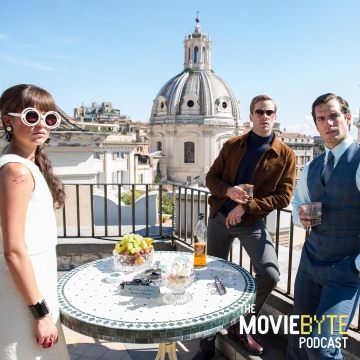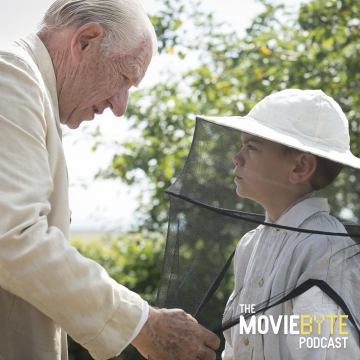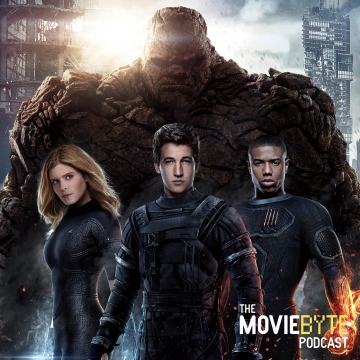
So just what is it that makes a good Star Trek film? I’m sure I don’t fully and completely understand the magic that makes any film a really good film, but I will say that most of it is wrapped up in Star Trek Into Darkness. Not only is it a good Star Trek film, but it’s a good film. For me, this is a turn around from J.J. Abrams’ 2009 installment, simply titled Star Trek. I did not feel that film was a good film, nor did I feel that it was a good Star Trek film.
A word about Spoilers
You should be forewarned that I cannot write this review without spoilers. I simply cannot. If you have not seen the film yet and you do not want to be spoiled, for the love of Kahless DO NOT READ ANY MORE OF THIS REVIEW!
A Great Villain

One big complaint of mine for the 2009 Star Trek film was that the villain seemed to be a bit lacking and one dimensional. This film has some definite improvements in this department.
For a very long time, rumors have been swirling around who this villain Benedict Cumberbatch plays might be. Many surmised Gary Mitchell (fueled by a “slip” from Karl Urban) and there were other guesses at other canon characters that I can’t recall at the moment. But one rumor surfaced and survived above all others. That was that Cumberbatch was playing Khan. The rumor would not die. And so J.J. and crew set about to tell us that he was not Khan, but that he was someone else named John Harrison.
J.J. and Co. even went so far as to create alternate scenes to hide Cumberbatch’s true identity in the trailers. And yet at the same time they continued to throw hints out that it may still be Khan. Some it seemed, deliberately, and some, it seemed, were accidents. It was just enough that most of us, including yours truly, decided that it could not be Khan because J.J. is a secret keeper and the hints and nods were a bit too strong. So I went into the theater really expecting it to be someone else.
As it turns out from this side of having watched the film, J.J. is an even better master at the art of denial and deceit than I had given him credit for. He played the craft well and held his cards close to the vest right up until, at least for me, Kirk started beating on him and “Harrison” didn’t flinch or bruise or bat an eye. Then of course there’s the 72 torpedoes. It was then I began to have my real suspicions.
And then, about half way through the film, in the brig, John Harrison reveals his true identity. “My name… is… Khan!” In my first viewing amidst hard core Star Trek fans in the IMAX 3D on May 15th (one day before wide release), the cheers and eruption from the viewers upon the utterance of that line was uproarious, the excitement palpable.

But this wasn’t your garden variety Khan, at least not yet. There was a bigger bad guy who must be defeated. The C in C of Starfleet, Admiral Marcus, who is willing to sacrifice officers and entire crew to start a war and do other bad things. In order to beat this Admiral Marcus, Kirk must team up with Khan. And this is the interesting thing, at this point you believe that circumstances could be different. And even right up until Khan betrays Kirk on the bridge of the U.S.S. Vengeance, you believe things could be different. In fact I still wonder (as one does speculate about fictional characters in fictional universes, right?), if Kirk had not been the one to instigate the betrayal by having Scotty “stun” Khan whether things would have turned out much differently. Probably not because Khan is an egotistical maniac, but who knows, right?
So, really, there are two great villains. Peter Weller is absolutely amazing as Admiral Marcus. Whenever he’s in a scene, he owns it.
And of course, as always, Benedict Cumberbatch is great. Even if he looks, acts, and sounds nothing like Khan as we knew him with Ricardo Montalban played him.
Characters Are In Place
I love to drone on and on about characters and character development when I write my reviews, or talk about films. And this film has (almost) all of it’s characters in the right places. Of course there’s Uhura who, as in the previous film gets a lot more to do, and a lot more growth and development than any other time we’ve seen Uhura in a Trek film before. And her unconventional relationship with Spock continues, which seems a great touch and is actually used well to further Spock’s character development.
Spock, for his part, is still learning what it means to be half hunan and half vulcan, as well as dealing with the issue of having lost his planet, and the large majority of the race he has chosen to mostly identify with (and though not mentioned specifically, certainly the loss of his mother). He’s also learning through his relationship with Captain Kirk — specifically how to have and be a friend.
Karl Urban’s “Bones” is spot on as previously, and he’s given more to do here, more interaction with Kirk and Spock, completing the Star Trek triangle we’ve all come to love over the years. And he gets to do some actual doctoring, on both humans and torpedoes (Star Trek VI anyone?).
And Scotty, man is Scotty a lot better. He did not seem at all like Montgomery Scott in 2009. Here, we see Montgomery Scott written all over Simon Pegg. It is not a mirror performance of James Doohan, but Scotty’s qualities are present and mixed with Simon Pegg’s humor. I loved this version of Scotty a lot better.
Kirk’s Journey

But the real development here, the primary character this story is about, is Kirk. Herein is addressed one of my biggest complaints — and though the problem can never be fully resolved from the mess created in the 2009 film, this does help. You see, in the previous film, Kirk is promoted from 3 year cadet, straight to captain of the Enterprise. I don’t care what he did, how brave he was, or how much he saved earth and starfleet, he was simply not ready for the captain’s chair. It’s impossible for someone that young (and arrogant in the case of Kirk) to be ready. He still needed to work up through the ranks and learn some lessons. No way in our real world would this have happened. But in that Star Trek world of this film, it did, and so it needed to be dealt with.
In this film, we see Kirk taking unnecessary risks and flouting Starfleet rules. Kirk may have a reputation for being a bit of a rebellious rule breaker, but this is quite undeserved. All throughout the original series, Kirk demonstrated well that he followed orders and obeyed the rules. There was one, single exception, and it was when his friend’s life was at stake. If he did not get Spock back to Vulcan in Amok Time, Spock would die. This was unacceptable to Kirk so he disobeyed orders. The only other time for rule breaking and order disobeying came in Star Trek III when the high ups in Starfleet were just being idiots and Kirk needed to, again, save his friend.
It’s obvious in this film that we need to get Kirk to that point, that here he feels like he can break the rules any time he pleases. And he does so quite badly.
So he gets demoted to Commander and first officer under Pike. This, by the way, is Pike’s doing. Starfleet was going to send him back to the academy, but Pike stepped in. His relationship to Kirk is fleshed out a little bit, but then, Khan kills Pike in an attack on Starfleet HQ (a lot of people are killed actually).
I don’t want to pass this moment by too quickly even though there’s not too much to say about it. J.J.‘s skill as a filmmaker here is apparent because, though we barely know Pike really, and have not had any history with him at all in previous incarnations of Trek, this is the second most moving scene and tear jerker moment in the film. And this scene is also the first time we’ve seen Kirk cry in this incarnation and timeline of Trek. This really hurt him.
The only thing Kirk wants is revenge, and he’s a bit short sighted in that pursuit. But along the way, Kirk learns more about what it means to be the captain than at any other time, than we’ve ever seen in any other Trek film.
But I Have A Complaint
I have already alluded to this: Ever since Star Trek III I have been entirely weary of the “most of Starfleet are idiots and/or bad guys, but Kirk and co. are good” thing. And Admiral Marcus’ villainy does grate on me a little. There’s a lot of nods, and a little bit of rehash in this Trek film, but though this is not a rehash of anything in particular, it is the most irritating to me. Are we really expected to believe that Starfleet is made of nothing but idiots and villains, and that Admiral Marcus could so easily turn to evil genius and hide in the ranks, AND build that big stinkin’ ship plus keep it hidden, as well as his agenda? Come on, guys, don’t insult our intelligence (get the reference?).
Shields at 6% Captain!
Crumbling from within is not my only irritation with this film.

Did you like action in your Star Trek films? Well you’re in so much luck, because this film has action. Space battles? It’s cool, that’s here too. Do you like big honkin’ ships being one-upped by even bigger ships? Got it! Do you like action interrupting plot and exposition? Check!
Oh wait, ugh. Yeah, that happens a couple times, and it annoys the stuffing out of me. A couple of times, this film does sacrifice story on the altar of action. And sometimes it sacrifices consistency for the sake of the action, or for the sake of the plot in some cases. For instance, Sulu at one point claims the shields are at 6%, and yet we just clearly saw torpedoes, and what now passes for phasers (though they indeed look for all the world like Star Wars blasters) ripping through the hull of the Enterprise and not slamming into the shields.
At yet another point, a crew member is beamed off the Enterprise while the shields are still up, and not 15 minutes later, the enemy must negotiate to get the shields down so he can beam over that which he wants. It’s a bit sloppy writing if you ask me.
Also, are you really trying to tell me that earth has no defensive capabilities, no satellites in orbit to detect what is going on, and/or no other ships in the area to detect what is going on and put a stop to it in this timeline? This all is just way too convenient for the writers.
Also, apparently the trip to Kronos used to take four-ish days at warp 5, now only takes 10 minutes (or less) because the Enterprise cannot have been at warp for for than a few minutes before the the Vengeance sneaks up behind at high warp and starts firing, which causes the Enterprise to drop out of warp only a few hundred thousand kilometers from earth.
And my biggest complaint is having Spock yell “Khan”. That just didn’t work.
But ultimately, though these are complaints, they didn’t stop me from enjoying the film. These sorts of annoyances have always had to be put up with in Star Trek. It’s hard to keep a big fictional universe like this consistent.
Music
Yet another win for Star Trek Into Darkness. While I did not really enjoy the score for the 2009 film from Michael Giacchino, the work he turns in here is some of his best work. Though one of my complaints still stands — that he did not incorporate enough Star Trek theme into his music, we did get a couple more hints at it here and there than before. And his theme for Khan is simply stunning. I have the soundtrack and have been listening to it a lot and I really, really love that three note theme. It’s simple and haunting and helps add to the perception of the complicated villain that Khan is.
Role Reversal
The part of this film I would have thought in theory to have found the most annoying turns out to be perhaps the best part. As Kirk’s character develops into the Kirk we knew before, he must learn how to sacrifice, how to put his crew first, how to put the needs of the many ahead of the needs of the few. And Spock is learning how Kirk thinks as well. Kirk has always been the one doing the outwitting, but in this film, it is Spock that outwits the enemy, and Kirk who sacrifices himself to save the ship. The film even goes as far as paying serious homage to the Spock death scene in The Wrath of Khan but with the roles reversed. As I said, this in theory should annoy me but I found it quite moving instead. Kirk has learned what it takes to be captain, and Spock has learned what it takes to be the half-human, half-vulcan that he is.
Thrusters On Full
Though this film fails to displace the one it pays homage to as my favorite Star Trek film, I did enjoy it immensely and I highly recommend it. This feels like Star Trek where the previous film did not. And it’s got the goods where it counts, good action (even a little too much for my taste) if you’re into that, but great story and great character development. If you are a Trekkie, you will get the references and the finer points of the plot. If you are not, you will enjoy this film as well.
This is a good one and worth your attention.



